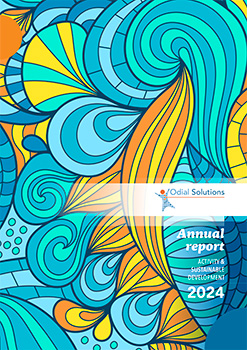2023, a year of change
Diversifying activities to bring modern solutions

We’re gradually moving away from our original business, to focus increasingly on the public works sector, selling hydraulic parts. We had foreseen this change in the market: the market for drinking water access solutions in sub-Saharan Africa reflects the demands of policy-makers. The key to development is to modernise the way that water is delivered to the people. The aim can be summed up in the slogan “One household, one tap”. Not only in urban areas, but in rural regions too, and this is Vergnet Hydro’s core business.
Restructuring teams to adapt to the new model
This change in our business has naturally had an impact on Vergnet Hydro’s internal organisation. We are gradually moving away from a business selling products – our HPV pumps – to a project development activity, DWS.
However, rolling out a project to build a drinking water supply network requires a considerable level of commitment and follow-up, making it far more complex and time-consuming than simply shipping equipment “off the shelf”.
To calculate the dimensions of a water supply network, design a pumping station or reservoir, hire subcontractors to construct buildings, hook up electrotech cabinets and connect hydraulic equipment, our company needs to become an EPC (Engineering Procurement and Construction) company, encompassing a wide range of skills and requiring meticulous coordination.
To achieve this, Vergnet Hydro overhauled its internal organisation in 2023. The Sales and Operations Department became the Sales and Projects Department, with a Sales unit, an Engineering unit dedicated to projects from the bidding stage through to implementation, and a Project Support unit. The Operations Department provides increased expertise in purchasing, logistics, shipment preparation and flow management.
At the same time, and in line with the corporate strategy we defined in 2020, we are strengthening our local presence in Africa, so that we can assign more services to our sub-Saharan employees. We are promoting our African subsidiaries and training young engineers and technicians on the ground; they are fresh out of school but poorly prepared for the reality of implementing projects in the field. We are hiring experienced local project managers to implement and oversee our projects in these countries; they are our “eyes on the ground”.
In France, we are adapting our ERP system to track projects more efficiently. Although we are an SME, we are introducing concepts used in large-scale industry to better control risks, correct discrepancies and define priorities. The performance and satisfaction of our customers remain our core concerns.
We are already applying this adapted organisation to the DWS projects we are involved in: the Treasury project in Côte d’Ivoire, and the water supply projects in Mali, Niger and Chad.
Adapting to changes in the African market for access to drinking water, without forsaking the past
While we are slowly exiting the HPV market, we are not completely forsaking it. First, because the construction of drinking water supply systems is still a long way from meeting the needs of the entire rural population. Villagers still rely on the human-powered pump as their primary means of accessing water. When it comes to after-sales service and creating new water access points, Vergnet Hydro remains very actively involved, always ready to listen to its customers. This is confirmed by the HPV equipment contracts that the company signed in 2023, for example with the public authorities of Côte d’Ivoire and Togo.
Finally, under the impetus of the Sustainable Development Goals, governments have turned their attention to the maintenance of water distribution equipment. Investment must not be an end in itself. Servicing and ensuring the long-term operation of facilities have become a priority. But how can we ensure that maintenance costs do not become an unsustainable burden for states with limited resources? The concept of delegated services is spreading fast: the user no longer pays for the water, but for the distribution service. And it’s much easier to convince users of the notion of service and payment when getting water is no longer a chore, requiring them simply to turn a tap rather than walking, pumping and carrying the water they need for their family every day.
Uduma intends to spearhead this approach in rural Africa. It is testing different water service management models in the field. Uduma signs public service delegation contracts with local authorities, for example in Mali for a fleet of human-powered pumps, in Burkina Faso for a series of drinking water supply systems, or in Côte d’Ivoire for autonomous water distribution points (Treasury project). This enables the company to collect both technical and financial data on a daily basis; this data will then help define the best management model for drinking water supply installations in a context where the purchasing power of rural populations remains limited. Uduma is also working to adapt equipment to facilitate the daily lives of users but also the management and maintenance of this equipment. The automatic solar standpipe is one example.
The media reports tend to imply that certain regions of Africa are currently experiencing significant political and economic turmoil, causing much concern. Nonetheless, there is still a huge overall need for infrastructure. The Odial Solutions group and all its subsidiaries are firmly committed to supporting the development of these countries.
Christophe LEGER,
Deputy Managing Director, VERGNET HYDRO, ODIAL SOLUTIONS group
To know more :
2024 Annual Report



